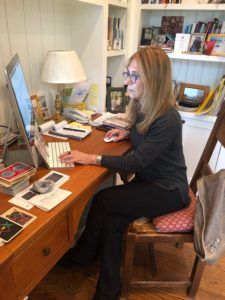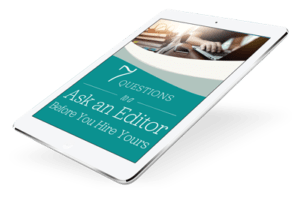After Your Finish Your First Draft, Consider Developmental Editing
 What comes next after writing a first draft? One thing you probably need is developmental editing:
What comes next after writing a first draft? One thing you probably need is developmental editing:
- Read through the first draft.
- Consider whether the overall structure works or whether it may need to be structured differently (Note: here’s where an experienced, objective editor can help)
- Move around sections or chapters to create a better flow
- Cut material that feels extraneous, breaks the flow or belongs in a different book
- Identify where you need to develop more (adding details or new information)
- Identify any additional research that needs to be done and included.
It’s often ideal to hire a developmental editor for this phase. However, you can also get feedback from beta readers, asking specific questions about structure, what’s missing, what seems extraneous, etc.
Now, Dig Deeper
Once you’ve addressed structure, where to cut and where to develop, it’s time to do that developmental work.
It depends on how rough that draft is, but if you’ve been drafting without editing (which is an effective strategy), there’s a good chance you need to go deeper.
How to go deeper?
- You may want to expand on the technical information in your book.
- Or you may want to do more research.
- Perhaps you want to add exercises, prompts, quotes or other features.
- You may be able to make your anecdotes more compelling by adding specific details.
A Case in Point
 Bring Your Book to Life® Program participant Dr. Lisa Langer has one more chapter to go on her first draft of her mindfulness book, ahead of target for the May 1 deadline when class ends.
Bring Your Book to Life® Program participant Dr. Lisa Langer has one more chapter to go on her first draft of her mindfulness book, ahead of target for the May 1 deadline when class ends.
Last week, we talked about what comes next, focusing particularly on developmental editing.
I suggested going deeper with the stories she shares from her workshops and from her work with clients. Most of the stories are composites, giving her freedom to add details and well as keep client information confidential. I suggested she contact some of the people she based stories on and ask them for more details about their experiences and their more recent results.
Dr. Langer asked an excellent question, “What’s your advice for interviewing?”
[bctt tweet=”How to Interview a Subject So You Get Compelling Stories and Information” username=”LisaTener”]
One of my main tips for interviewing is to ask open ended questions, rather than those that can be answered, “yes” or “no.” A person’s first answer is usually at the surface. Ask a couple of a questions to get at the deeper details. You can encourage the interviewee to share more details with open ended prompts:
- “Tell me more about….”
- “Because…”
- “And…”
- “What is it about x that y…?”
You can also ask them to add sensory detail:
- “How did that feel in your body?”
- “What did you see/hear/smell/feel/sense?”
How Dr. Langer Got a First Draft Done in 8 Weeks (Despite Being in the midst of selling Her House)

I also asked Dr. Langer about her experience in writing her first draft so quickly. What worked?
- Vision: Dr. Langer continued to connect with her vision and remind herself why she was writing the book, including providing support that people often craved once they completed the mindfulness course, increasing her speaking opportunities and becoming more widely known for her expertise. I encourage everyone in my classes to develop a vision statement that they can read daily to stay in touch with that vision and allow it to evolve, as well. This helps writers stick to their commitments and also to write from a place of passion.
- Scheduling: Dr. Langer scheduled specific dates and times for her writing, and kept her writing commitments.
- Using the Financial commitment for Leverage: Dr. Langer reminded herself that she made an investment in the course and that writing a first draft would make the most of that investment.
- Accountability: Dr. Langer met with her accountability partner weekly by Zoom video to assess:
- whether they met the commitments they had made
- what worked
- what did not work
- what next steps they commit to for the following week, doing more of what worked and fine tuning or problem solving for where they fell short
Such accountability meetings or calls take 10-15 minutes a week, when done properly (no excuses, no long stories, just the facts, ma’am). The check ins worked so well that she and her partner added similar check-ins by email a few additional times per week.
Read more editing tips to tighten your writing. as well as these 7 editing tips to polish your writing and bring your words to life for your readers.
Hire An Editor

Once you’ve done some self-editing, or else feel stuck or overwhelmed by editing, it’s probably time to find and hire an editor. The post I just linked to can help you determine the phases of editing and how to go about finding and hiring an editor. In addition, be sure to download my free ebook: 7 Questions to Ask An Editor Before You Hire Yours.
Your Turn
- How is your writing coming?
- What’s working for you?
- What challenges are coming up?
- Do you have any developmental editing tips to share?
Share your comments, insights and questions as a comment below.

